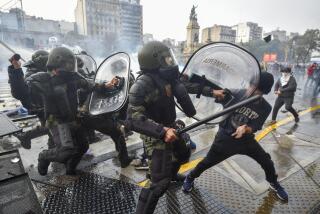Election No Help to Argentine Economy : Peronist Winner, Incumbent Meet, Discuss Debt Mission to U.S.
- Share via
BUENOS AIRES — Four days after the Peronist party’s landslide election victory, Argentina slid closer to the economic abyss Thursday as the nation’s currency plunged and the markets ignored pleas for calm.
President-elect Carlos Saul Menem and President Raul Alfonsin of the ruling Radical Civic Union agreed in their first meeting since the election Sunday to work together to make the transition “the least traumatic possible.”
Adding to an atmosphere of inflation-fed anxiety, the government announced that utility rates, the price of gasoline and bus fares and other public service charges would be increased, effective today, by an average of 40% to bring them into line with soaring costs.
Uncertain about what will happen between now and Dec. 10, when Menem is to take office, and what will happen afterward, many Argentines were converting their savings into dollars. The dollar, worth 16 australs in February and 106 on the Friday before the election, shot up 18.5% Thursday to close at 165 australs.
Menem said after half an hour at Casa Rosada, the presidential palace, that he and Alfonsin had discussed sending a bipartisan delegation to the United States to try to renegotiate the foreign debt and arrange for fresh financing.
Mired in its worst economic morass of the century--this helped propel Menem to a 49% to 37% victory Sunday--Argentina has made virtually no payments on its $60-billion debt in more than a year and is about $3 billion in arrears.
The 58-year-old president-elect avoided questions on what specific measures should be taken to stabilize the situation. He said that Alfonsin will be in charge until December and that the two parties cannot govern together. He and Alfonsin have both rejected suggestions that the interim period be shortened, although this is sure to be an issue in impending constitutional reform talks.
The clear-cut outcome of the election had raised hopes of easing the tension that took hold in February, when Alfonsin’s price and currency stabilization program collapsed and the economy went into a sharp decline. Many Argentines had worried that a close vote would lead to months of political wrangling, but the decisive Peronist victory gave Menem clear control in both houses of Congress.
Still, the economic problems have quickly overcome the optimism. The inflation rate for May is officially expected to be 45%. Buying power has withered. Uncertainty has led producers to slow their output, and this has led retailers to limit some goods such as sugar to one or two packets to a customer. Some brands of aspirin and other medicines are not available.
The Menem-Alfonsin meeting did nothing to calm turbulent markets, which resumed the violent swings that have characterized them since the stabilization plan fell apart. The stock market surged nearly 16% while short-term interest rates rose to an annualized 1,600% from 1,400% on Wednesday.
Daniel Artana, an economist at a private research institute, said Menem needs to give some specific signals that he will attack the budget deficit, the principal cause of inflation, “to show that Peronism really has changed.”
“If Menem would say, ‘We are going to attack the state deficit, we are going to send thus-and-such measures to Congress,’ that would calm the situation,” Artana said. “The people see that Alfonsin cannot govern, and Menem hasn’t said what he is going to do, so the people are seeing a great uncertainty and are taking refuge in the dollar.”
Menem, a leader of the reformist wing of the worker-based Justicialist Party, as Peronism is officially called, has promised a pragmatic, modern approach to economic issues, based on pacts with business and labor to achieve a “productive revolution.”
He has acknowledged the need to reduce the state’s domination of the economy, a legacy of the party’s founder, Juan D. Peron, that goes back to the mid-1940s. Hapless government-owned businesses, such as the state oil company, run up multibillion-dollar deficits every year.
Aware that the Radicals’ economic failure contributed to his victory, Menem was clearly reluctant to share the blame for the government’s handling of the economy before he takes office.
Menem said he will visit the United States in the interim period, if a meeting can be arranged with President Bush. U.S. Ambassador Theodore E. Gildred met with Menem on Thursday and said he assured him of “the complete support of my government so that this country has every possibility of recovery.”
In contrast to harsh U.S. criticism of Peronism in the past, the United States was neutral in the campaign. American officials said that what matters most is a free and democratic transition.
More to Read
Sign up for Essential California
The most important California stories and recommendations in your inbox every morning.
You may occasionally receive promotional content from the Los Angeles Times.










